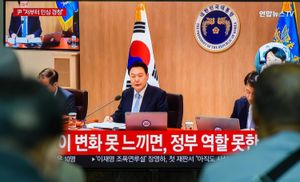The Thai government is undertaking significant initiatives to revitalize the economy, primarily focusing on substantial cash distributions and legislative protections for the growing freelance workforce. At the helm of this effort is Prime Minister Phaetongtarn Shinawatra, who is spearheading the government's digital wallet scheme, aimed at distributing 10,000 baht to citizens to stimulate domestic spending and economic activity.
This ambitious project is part of broader measures to combat inflation and rekindle economic growth following challenging times exacerbated by the pandemic. Authorities have set their growth target for 2023 between 3% to 3.5%, and the digital wallet initiative, expected to inject around 260 billion baht (approximately $7.4 billion) directly back to the populace, is seen as pivotal.
Labor Minister Pipat Ratchakitprakarn emphasized the importance of protecting the rights of the freelance and informal worker sector, which he estimates comprises over 21 million individuals in Thailand. "The government aims to secure labor rights for freelance workers, as they are integral to our economy," he affirmed during recent discussions aimed at integrating these workers more fully within the social safety net.
Recognizing the pressing need for economic stimulus, the administration is also emphasizing legislative measures to improve access to social security for the informal workforce. This takes the form of proposed laws aimed at offering improved protections and benefits for those outside the traditional employment framework, allowing them to gain access to the same social securities afforded to formal employees.
With Bangkok harboring over 1.5 million freelancers alone, the government's recognition of this demographic's role as economic contributors signifies its commitment to inclusive growth. To facilitate their entry to social security systems, initiatives include lower contributions plans and micro-financing options geared toward lessening the burden on these workers.
Another significant aspect of the government's plan involves bolstering the spending of state enterprises, which are forecasted to invest over 100 billion baht this fiscal year alone. The government has indicated it will streamline project approvals to kickstart these investments as early as this quarter, hoping to leverage increased public spending to stimulate wider economic recovery.
Among the measures planned, the government has also proposed cash allowances to senior citizens and various subsidies to stimulate consumer spending directly. These actions are strategically timed to coincide with the rollout of the digital wallet initiative, which is projected to commence distribution within the next few months.
Economic analysts widely regard this move as timely. The administration's willingness to allocate significant funds as direct cash payments, together with measures to manage inflation, reflects its acknowledgment of the economic distress faced by segments of the population.
The Ministry of Finance is working on additional support measures to roll out alongside these initiatives. Analysts suggest these measures may include tax incentives for small and medium-sized enterprises (SMEs) and improved access to credit facilities, potentially providing the necessary liquidity to businesses struggling with enhanced operational costs.
One of the primary concerns tackled head-on is the rising inflation stoking costs across the board, which is affecting consumers' purchasing power. The government is being urged to not only raise the monetary value of allowances but possibly extend the type of benefits provided. Higher proposed allowances for childbirth expenses and subsidies for education are being explored.
While optimism around these initiatives is palpable, there's also caution urged among stakeholders who recognize the potential risks associated with high inflation and shifting global economic conditions.
Stakeholders from the Thai private sector have called for coordinated efforts from the government to prioritize sum expenditures judiciously. There are fears among industry leaders about the sustainability of such cash transfers if not optimized effectively. "It’s imperative for the government to balance rapid relief with long-term economic strategies to avoid inflationary repercussions," stated a local business leader.
Yet amid these concerns, the government's multifaceted approach promises to address immediate economic challenges and position Thailand for stronger growth trajectories moving forward. Enthusiasm for the digital wallet project, paired with legislative reforms for labor rights, marks a transformative period for Thailand's economic framework.



